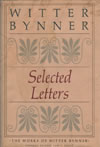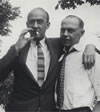
BE. Witter Bynner
 |
20. Selected Letters. Edited by James Kraft. Vol. 5 of The Works of Witter Bynner, edited by James Kraft. New York: Farrar, Straus, Giroux, 1981.
Chosen from more than seven thousand extant Bynner letters to more than thirteen hundred recipients, the selection represents those letters Kraft believes ‘best create a narrative of Bynner’s life’. In addition to those noted others mention Japan and Japanese subjects in passing (see index).
a. To Annie Louise Wellington, 16 April 1917. In the only letter in the collection written from Japan Bynner writes to his mother of his admiration for the ‘simple beauty’ of his room in a Japanese inn.
 |
||
| Bynner with Haniel Long, 1920’s
( |
b. To Haniel Long, 5 May 1917. A long remembrance of Japan written from Korea. Bynner admires ‘certain qualities in the Japanese’, their ‘self-control . . . honesty . . . kindness to one another . . . patience, persistence, endurance . . .love of children and flowers—and, always, their twenty-coat lacquer of cheer’, for ‘they make a gay conquest of conditions of poverty and cold which would reduce one of us to a heap of rags and curses’. The common people work harder than he had seen elsewhere in the world, and he was taken with their ‘child-like friendliness—the wonder and the sudden smile’. In spite of this, however, he was not comfortable in the country. He had met poets, scholars, journalists, hotelkeepers, merchants, and guides, and they made him ‘uneasy’. Both in their ‘silence’ and ‘behind [their] eager speech’ he sensed an unpleasant ‘reserve . . . perhaps a flash of steel in the embroidery, something German, something they have learned from us and learned too well’. Recounts details of travel in Kyoto, to the Straits of Shimonoseki, and to the house of Lafcadio Hearn (see D9), the last in language more engaging than the Bynner poem on the same subject (3a):
A Japanese house. A barefoot boy of nineteen with three or four strong hairs on his chin and strong goggles on his eyes. The Hearn nose. Otherwise, Japanese. Shy, shining, abrupt manners. Little English—none at first. His mother, out but sent for. I was led past two or three simple purely Japanese rooms, then stockinged my way across the oil-cloth floor of a small room with a few pieces of European furniture, table and chairs, into a study lined with bookcases but otherwise Japanese. My card was laid before Hearn’s picture in the little Buddhist shrine. Mother came. No English. Little sister. Next to no eyes. Bows. Smiles. Tea. I seemed to be the first pilgrim. They didn’t even know that the house was mentioned in the guidebook. Their name is Koizumi. They were pleased. I asked for a blossom from the garden. She gave it to me. But Kazuo Koizumi crossed and brought me a spray of little leaves, saying, “Father liked best the maples.” And of that I made a poem.
Reference here to the guidebook Bynner had with him in Japan would be to a work prepared by Basil Hall Chamberlain and W. B. Mason (see D5b).
c. To Barry Faulkner, 22 May 1917. Written from Shanghai. From the beginning Bynner preferred China to Japan and Korea: ‘Korea was exciting—but Peking is almost everything. I can’t get my breath from the wonder of it. Japan is but bothersome dust in the nostrils of the dragon.’
d. To Ruth Witt-Diamant, 7 August 1964. Witt-Diamant had accepted a teaching post in Tokyo, and Bynner writes of his ‘envy’ of her presence there, though mentions again his preference for China over Japan. During his 1917 journey, in Japan, ‘for all the slight squirming and giggling’, he ‘was never sure whether or not we were seeing and feeling with the same humor’, while in China ‘the mirth bottle would pop with champagne’. He wonders if the ‘Japanese eagerness to be laughing with us’ has over the years ‘reached . . . an inclination to be laughing at us’. He felt in Asia that ‘it would have taken very little decency for us to earn and keep a warm liking from the Chinese’, but the people of Japan ‘baffled’ him with ‘their apparent eagerness toward a liking they could not really muster’.

